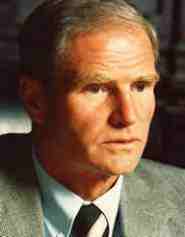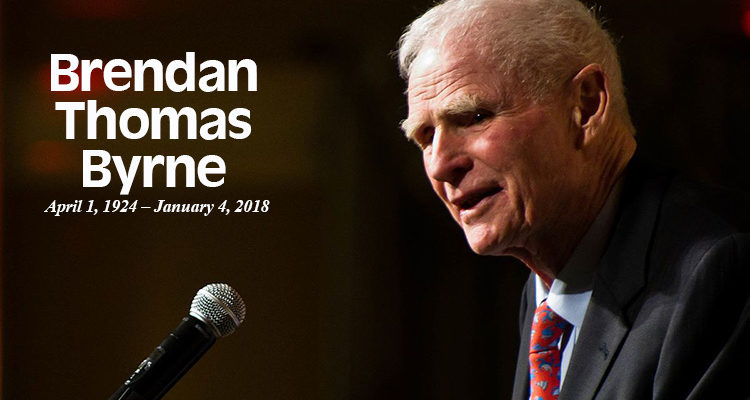Byrne remembered as “The Man the Mob Couldn’t Buy.”
Former New Jersey Governor Brendan Byrne has passed away at age 93.
Byrne, a Democrat, died Thursday at a home in Livingston, his son Tom Byrne said. He suffered an infection that went into his lungs and “was too weak to fight,” he son said.
The announcement of his death was made by Gov. Chris Christie, paying homage to “an extraordinary career of public service.”
Christie said he considered the late governor a mentor and a friend.
“My life is richer for having known him as I am sure are the lives of every person who had the privilege to meet him,” said Christie.
Byrne was born and raised in West Orange, New Jersey. He is the fourth child among five children of ethnic Irish American Catholic parents, Francis A. Byrne (1886–1974) and Genevieve Brennan Byrne (1888–1969).
In 1942, Byrne graduated from West Orange High School, where he had served as both the president of the debate club and senior class president. He briefly enrolled at Seton Hall University, only to leave in March the following year to join the U.S. Army. During World War II, Byrne served in the U.S. Army Air Corps, receiving the Distinguished Flying Cross and four Air Medals. By the time of his discharge from active service in 1945, he had achieved the rank of lieutenant.
After the war, and thanks to the G.I. Bill, Byrne attended Princeton University for two years, where he majored in Public and International Affairs. Due to the war, he spent only two years on campus, finishing his undergraduate thesis while enrolled at Harvard Law School.[1] He graduated from Princeton in 1949 and went on to obtain his law degree from Harvard Law School in 1951.[
On June 27, 1953, he married Jean Featherly, with whom he had seven children. Jean and Brendan Byrne divorced in 1993 and soon afterward Byrne married his second wife, Ruth Zinn, in 1994. Former First Lady of New Jersey Jean Byrne died in 2015.

Former New Jersey Governor Brendan T. Byrne
On January 15, 1974, Brendan Byrne was sworn in as the 47th governor of New Jersey.
Some of the policies enacted by the first Byrne administration include: the implementation of New Jersey’s first State Income Tax, the establishment of spending limits on local governments, county governments, school districts, and the state, the establishment of both the Department of the Public Advocate and the Department of Energy, and the implementation of public financing for future gubernatorial general elections.[12] Although Byrne claimed during the 1973 campaign that a personal income tax would not be necessary for “the foreseeable future”, he eventually “muscled through” the unpopular income tax, New Jersey’s first, in 1976; it earned him the nickname “One-Term Byrne”.
Byrne faced ten opponents in the 1977 Democratic primary, including future governor James Florio. However, Byrne obtained the party’s nomination and went on to defeat his Republican opponent, State Senator Raymond Bateman, in the general election on November 8, 1977. This despite the fact that in early 1977, three-quarters of voters disapproved of his job performance and in polls taken in the summer, he trailed Bateman by 17 points.
Byrne and Bateman debated nine times and Byrne used the governorship to his advantage, signing bills and appearing with cabinet members all over the state, benefiting from a visit by President Carter and turning what was his biggest weakness, the income tax, into a strength. Property taxes went down because of it, people got rebates and Bateman’s plan—replacing it with an increased sales tax—was widely criticised.
During his second term, Byrne focused on policies such as the passage of the Pinelands Protection Act, expansion of major highways, including the Atlantic City Expressway and Interstate 287, upgrades to sewage systems, further development of the Meadowlands Sports Complex, and casino-hotel development in Atlantic City. He is the most recent Democrat to be elected governor twice. The other Governors elected to two terms (Thomas Kean, Christie Whitman, and Chris Christie) have all been Republicans.
Byrne built his reputation as a crusading prosecutor and held numerous governmental positions during more than 30 years of public service. He also signed New Jersey’s first income tax into law and authorized the law permitting gambling in Atlantic City during his two terms as the state’s chief executive.
He won his first term as governor in 1973, beating Republican state Rep. Charles W. Sandman Jr. by more than 700,000 votes. His campaign was helped by an FBI surveillance tape that showed mobsters discussing how Byrne, the Essex County prosecutor in the 1960s, was too ethical to be bribed.










